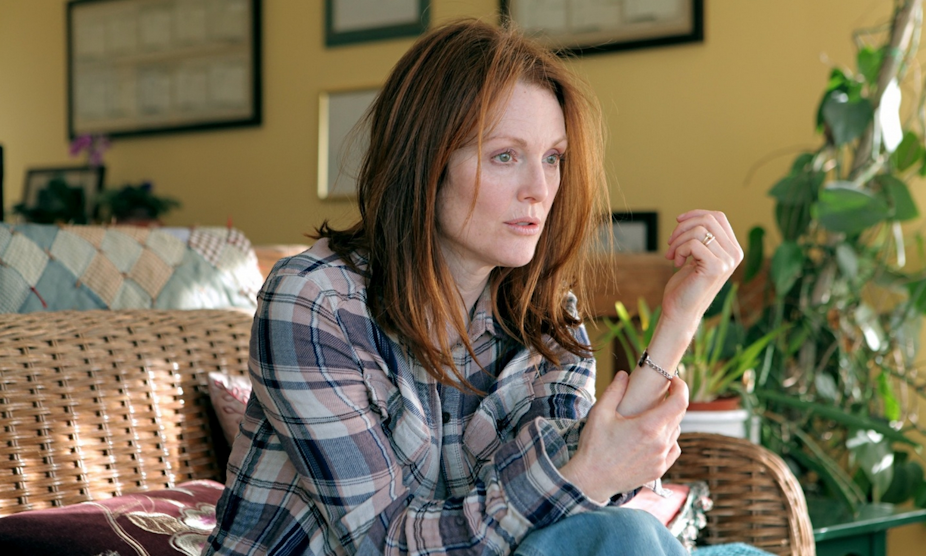Still Alice tells the story of a university professor who is diagnosed with an aggressive early-onset dementia. Her intellectual and physical capacity declines cruelly, and it’s certain that she has passed the genetic mutation she inherited on to at least one of her children. Such things happen. I recently met a lawyer like this. All her siblings were affected. Her own children, who were born before anyone knew about the family problem, also tested positive. The children in the movie are almost saintly. Such a reaction might be hoped for, but it’s of course not often the case. The lawyer’s children, for example, were not so well adjusted.
In a routine film review, I’d point out that Julianne Moore gives an exceptional performance and her supporting actors are excellent. The representation of her decline is faultless and sensitive. Touching on genetic testing and the response of descendants in affected families is inspired, the scene in which she addresses an Alzheimer’s conference terrific.
But this is not a normal film, as it’s being widely championed for raising awareness of this horrible disease. And yes, it could be a great public information film – but only after some key editing.
What’s missing?
You’d need more context, an additional film perhaps about the much more common and familiar population that doesn’t get affected until at least 20 years later than Moore’s character. Dementia is a disease of older people. Old women may not be so photogenic, but at 90 they have more than a 45% chance of having dementia, and a film about that might not be so easy to sell. You’d need a scene explaining the meanings of “dementia” and “Alzheimer’s” which most film makers and journalists wrongly use interchangeably. As it stands, the film only raises awareness of this particularly rare type of Alzheimer’s dementia.
I fully intended to be cynical about Still Alice, but I did cry. But I could tell I was weeping at different points and for different reasons from the rest of the audience in the cinema.
I cried at the banality of the neurologist asking the simple questions to confirm that his patient has dementia. Many patients tell me that it is like being set an exam, which, if you fail, you lose everything – your freedom, your home, your life. It’s not a dignified process when you fail to identify a duck and remember an address. It’s humiliating and though I saw that, I don’t know if others did.
Depicting dementia
A major ethical issue to be addressed is the framing of dementia by writers, artists, the media and even film makers. Does a popular movie about a health issue have moral worth or is it a just another source of cinematic thrill?
Many have argued that the film is a good thing in itself but there is a long tradition of exploiting sickness for dramatic rather than moral purpose. Younger audiences may have missed Love Story, a film from 1970 where an attractive talented young wife dies tragically of leukaemia. This was a similar plot to the successful and often remade The Lady of the Camellias, a 19th century play by Dumas. The untimely death of a lovely woman is inevitably a hit at the box office.
There are films that get around this sticky issue. Cortex, a 2008 film about ageing and dementia from the point of view of the protagonist who may have dementia, is one such example. Tom Christie’s review of the film saw it as able to shake the audience through its evocation of “insecurity, anger and fear”. This intriguing mystery presents a marked contrast to the emotional wringer that Still Alice puts one through.
The DIAMetric blog does regular reviews of how dementia is framed in the news media, showing how misleading most of the frames are, and how manipulative. The Dementia Festival of Ideas is exploring what difference arts and media actually make to the public perception of dementia and whether an active role in that is even appropriate. In 2012 a paper from Belgium precipitated much of this discussion of how controllers of media reinforce the stigmatisation of dementia. So these questions are prevalent, but have failed to enter the Still Alice debate.
There are questions about extent to which the artists are cynically feeding off current anxieties about dementia. We need to ask if it has a proper role in “raising awareness” and how that’s monitored. Who said that working age dementia should be the big-ticket topic for this year? Or was it just a cynical reworking of an old story, with a modern twist now that we better manage TB and leukaemia?
There was a time in dementia care where any move to raise awareness was better than nothing. But now, rather than being grateful for public awareness, we need to be more questioning of the effect of random publicity and fiction. There is great potential for unintended negative consequences. It is only a matter of time before the circus moves on and compassion fatigue about dementia takes over.
Sensible information in plain language is increasingly available, subsidised by charities and donations. We can’t afford to be muddled by Hollywood about what the big problem really is, although personal tragedy always wins more artistic prizes.

